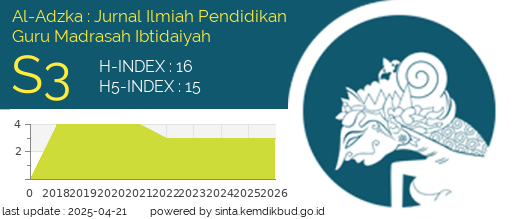Parenting in Sex Education for Children in The Use of Smartphone During The Covid-19 Pandemic
DOI:
https://doi.org/10.18592/aladzkapgmi.v12i1.5762Keywords:
parenting, sexual education, primary school children, smartphonesAbstract
Sexual deviant behavior of children often occurs as a result of excessive use of smartphones. That excessive use of smartphones needs to get the attention of parents. Parents' attention in using smartphones could be useful for children in understanding sexual knowledge from an early age because the use of smartphone have much information that is not suitable for the child's development and children's age. The purpose of this study is to determine the sexual education delivered by the parents to children, and to overcome children's sexual behavior due to the use of smartphones. This research uses a descriptive qualitative approach by applying case study. The data information is obtained from observation, interviews, and documentation. The data was obtained from 6 informants consist of parents in grade 3 and grade 6 at SD 7 Koba. The result of this study is parenting sex education for children is delivered in a gradual manner according to the child's growth and development phase. The information provided can support their lives and avoid sexual deviant behavior. Materials that can be provided by parents related to sexual education for elementary school children are intended to protect and defend themselves from crimes that threaten themselves from the negative influence of smartphone. To overcome sexual behavior in using smartphone, it is necessary to limit the duration, supervise, and accompany children in using smartphones.References
Aisyah, A., & Hasiana, I. (2021). Optimalisasi Peran Orang Tua Terhadap Pedidikan Seksual Anak Usia Dini. Jurnal Penamas Adi Buana, 4(2), 65–70. https://doi.org/10.36456/penamas.vol4.no2.a2695
Ansori, Y. Z. (2020). Pembinaan Karakter Siswa melalui Pembelajaran Terpadu Di Sekolah Dasar. Jurnal Educatio FKIP UNMA, 6(1), 177–186.
Asmawati, L. (2021). Peran Orang Tua dalam Pemanfaatan Teknologi Digital pada Anak Usia Dini. Jurnal Obsesi : Jurnal Pendidikan Anak Usia Dini, 6(1), 82–96. https://doi.org/10.31004/obsesi.v6i1.1170
Auliam, H ., & Himawanti, I. (2020) Tahapan Pendidikan Seks dalam Kajian Psikologi dan Al-Qur’an. Jurnal Kajian Ilmu dan Budaya Islam, 192-212, https://doi.org/10.36670/alakin.v2i02.20
Bella, S. (2017).Pendidikan Seksualitas Sejak Dini sebagai Upaya Menghindarkan Anak-Anak Usia Sekolah Dasar dari Penyimpangan Seksualitas. Jurnal Penelitian Pendidikan Guru Sekolah Dasar, 5(3), 254539.
Damayanti, E., Ahmad, A., & Bara, A. (2020). Dampak Negatif Penggunaan Gadget Berdasarkan Aspek Perkembangan Anak di Sorowako. Martabat: Jurnal Perempuan Dan Anak, 4(1), 1–22. https://doi.org/10.21274/martabat.2020.4.1.1-22
Dewi, P. A. S. C., & Khotimah, H. (2020). Pola Asuh Orang Tua pada Anak di Masa Pandemi Covid-19. Seminar Nasional Sistem Informasi, 2433–2441.
Februanti, S. (2020). Implementasi Pendidikan Seks Underwear Rules Sebagai Upaya Pencegahan Kekerasan Seksual Di Tasikmalaya. Edukasi Masyarakat Sehat Sejahtera (EMaSS) : Jurnal Pengabdian Kepada Masyarakat, 2(1), 38–43. https://doi.org/10.37160/emass.v2i1.469
Fitria, M. (2017). Integrative Sex Education For Children. Jurnal Psikologi Integratif, 5, 77–93.
Ginting, M. N. ., & Hengki, F.(2020). Efektivitas Psikoedukasi pada Orang Tua sebagai Alternatif Pencegahan Kekerasan Seksual pada Anak. Jurnal Pionir LPPM Universitas Asahan, 7, 136–149.
Habibie, A. (2017). Pengenalan Aurat Bagi Anak Usia Dini dalam Pandangan Islam. Early Childhood : Jurnal Pendidikan, 1(2), 76–85. https://doi.org/10.35568/earlychildhood.v1i2.115
Indah, A. S. (2020). Peran Orangtua dalam Pendidikan. Wahana, 72(2), 118–125.
Kurniati, E., Nur Alfaeni, D. K., & Andriani, F. (2020). Analisis Peran Orang Tua dalam Mendampingi Anak di Masa Pandemi Covid-19. Jurnal Obsesi : Jurnal Pendidikan Anak Usia Dini, 5(1), 241. https://doi.org/10.31004/obsesi.v5i1.541
Laili, N., Vibraena, V. M., Silmi, N., Ummah, U. S., & Efendi, M. (2020). Mantuku (Manekin Tubuhku: As an Adaptive Media for Sex Education to Toddlers). Iceccep 2019, 146–151. https://doi.org/10.2991/assehr.k.201205.102
Lubis, H., Rosyida, A. H., & Solikhatin, N. H. (2019). Pola Asuh Efektif Di Era Digital. PLAKAT (Pelayanan Kepada Masyarakat), 1(2), 102. https://doi.org/10.30872/plakat.v1i2.2967
Margaretta, S. S., & Kristyaningsih, P. (2020). Knowledge and How To Prevent Sexual Violence in. 57–61.
Maria, I., & Novianti, R. (2020). The Effects of Using Gadgets during the Covid-19 Pandemic on Children’s Behaviour. Aṭfāluna: Journal of Islamic Early Childhood Education, 3(2), 74–81. https://doi.org/10.32505/atfaluna.v3i2.1966
Ngatiningsih. (2020). Pendidikan Seks Untuk Anak Usia Dini Melalui Keluarga. Pauddikmasbengkulu.Kemdikbud.Co.Id, 5. https://pauddikmasbengkulu.kemdikbud.go.id/index.php/8-pendidikan-seks-untuk-anak-usia-dinimelalui-keluarga
Sobon,K., Mangundap, J.M., & Walewangko, S. (2019) Pengaruh Penggunaan Smartphone terhadap Motivasi Belajar Siswa Sekolah Dasar di Kecamatan Mapanget Kota Manado. Autentik: Jurnal Pengembangan Pendidikan Dasar,
Soesilo, T. D. (2021). Pelaksanaan Parenting Pendidikan Seks (Pesek) Anak Usia Dini di PAUD Tunas Bangsa Ungaran Kabupaten Semarang. Scholaria: Jurnal Pendidikan Dan Kebudayaan, 11(1), 47–53. https://doi.org/10.24246/j.js.2021.v11.i1.p47-53
Sulistiyowati, A., Matulessy, A., & Pratikto, H. (2018). Psikoedukasi Seks untuk Mencegah Pelecehan Seksual pada Anak Prasekolah. Jurnal Ilmiah Psikologi Terapan, 6(1), 17. https://doi.org/10.22219/jipt.v6i1.5171
Supriyono, L. (2020). Peran Orang Tua Dalam Menyikapi. 1–22. http://e-repository.perpus.iainsalatiga.ac.id/id/eprint/8289
Downloads
Published
How to Cite
Issue
Section
License
Authors who publish with this journal agree to the following terms:
- Authors retain copyright and grant the journal right of first publication with the work simultaneously licensed under a Creative Commons Attribution 4.0 International that allows others to share the work with an acknowledgement of the work's authorship and initial publication in this journal.
- Authors are able to enter into separate, additional contractual arrangements for the non-exclusive distribution of the journal's published version of the work (e.g., post it to an institutional repository or publish it in a book), with an acknowledgement of its initial publication in this journal.
- Authors are permitted and encouraged to post their work online (e.g., in institutional repositories or on their website) prior to and during the submission process, as it can lead to productive exchanges, as well as earlier and greater citation of published work.












